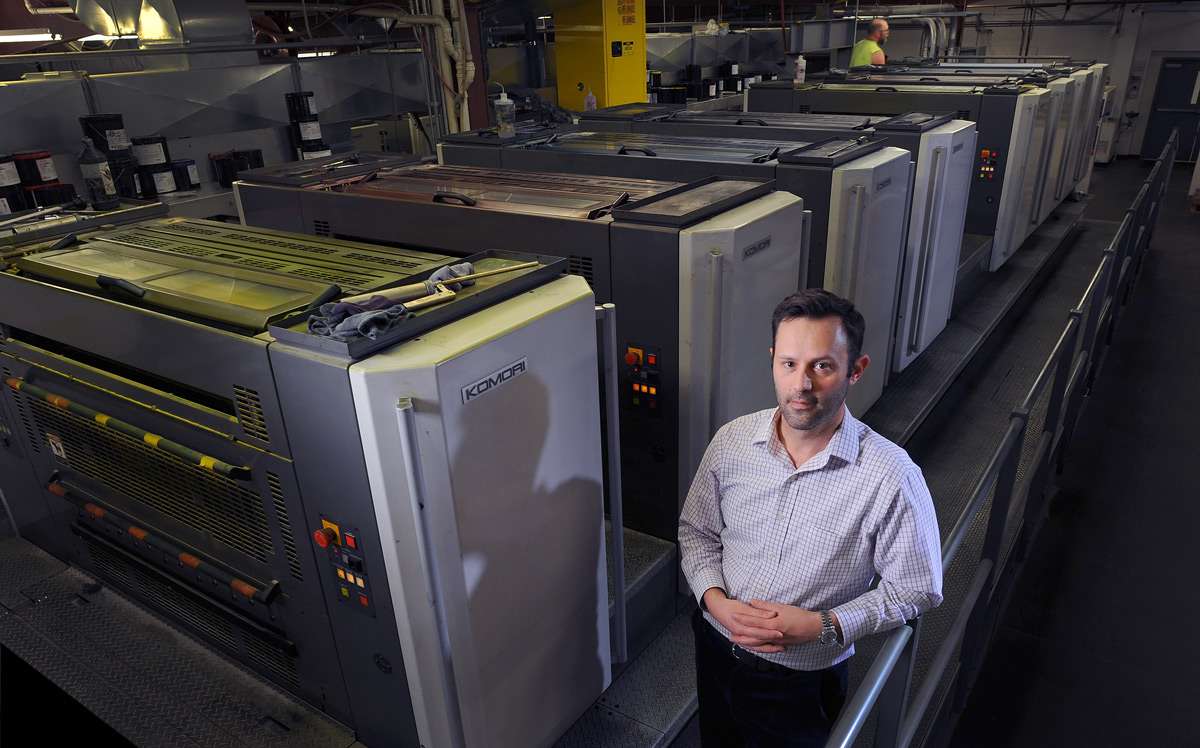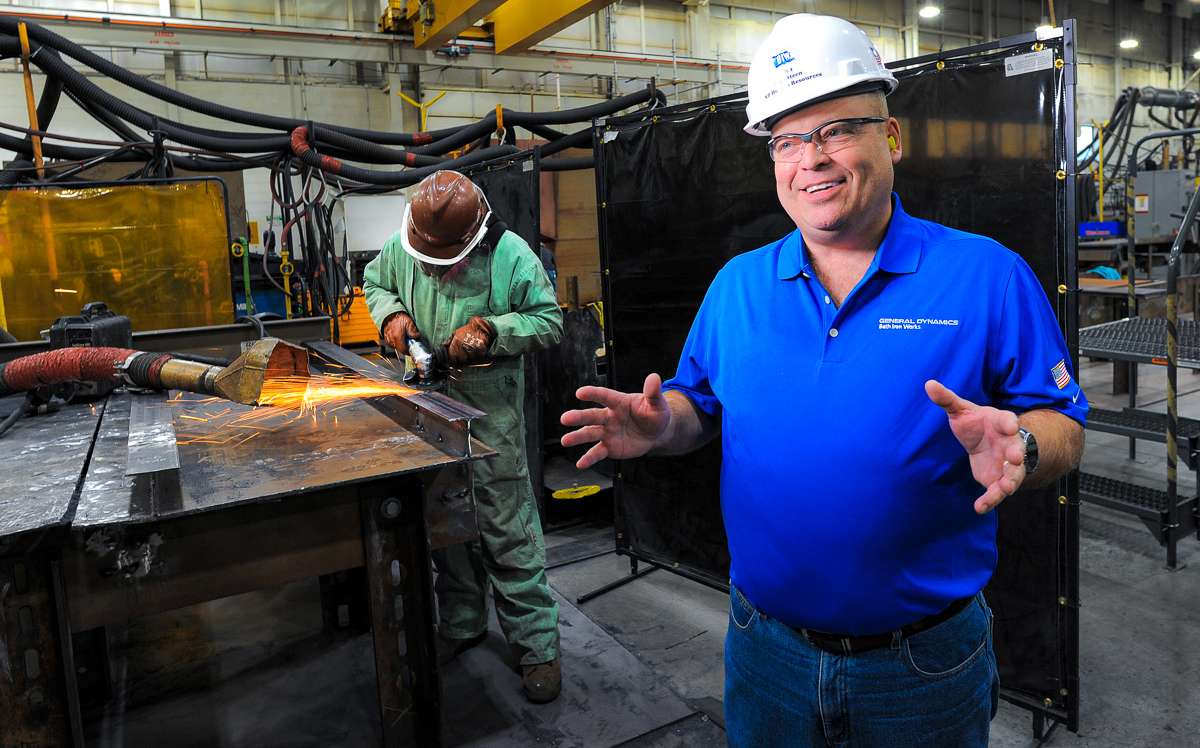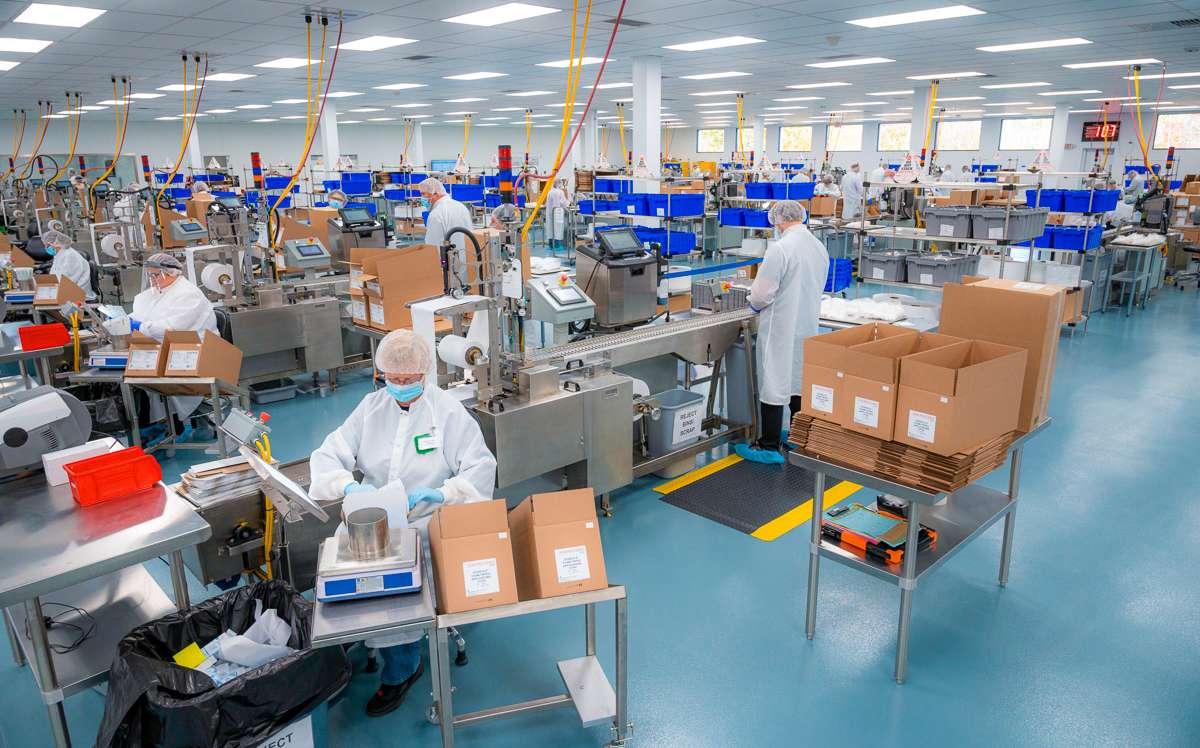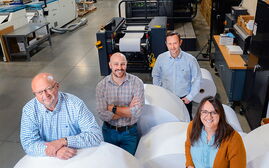
Widgets, workers and wages: Maine manufacturers get more strategic about recruiting
 Photo / Fred J. Field
Larry Burke checks the color on a magazine run at Franklin Printing.
Photo / Fred J. Field
Larry Burke checks the color on a magazine run at Franklin Printing.
Manufacturing is not an easy industry to hire for these days, as Franklin Printing can attest. The Farmington-based commercial printing firm started as the in-house production facility for the Livermore Falls Advertiser and the Franklin Journal newspapers in the late 1960s.
Today with a focus on commercial printing, the family-owned firm employs 53 people and is seeking to fill two jobs, including a purchasing manager position that’s been open for nearly a year.
“When I started in the business, we would go a long time without needing to hire someone, we had such a good base of employees,” says General Manager David Nemi, who started at the company 19 years ago as a marketing and sales manager. “Many of them are still here, but only in the last few years have we had to really think about the recruiting process more and how are we going to make it work better for us?”
While online ads used to do the trick, Franklin Printing now works with an outside recruiter, Falmouth-based KMA Human Resources Consulting LLC, for advice on where and when to place ads. Through the partnership, Franklin Printing has become more conscious of offering a competitive wage and benefits, including paid time off beyond the legal requirement.
Despite all those efforts, finding the right fit isn’t a given. “There’s a lot of competition,” Nemi says. “There were times when we didn’t react fast enough and the person accepted another job – I mean in a day or two after speaking to the recruiter, not a matter of weeks.” There was also at least one new hire who didn’t last more than a few hours.
“We’ve never had anyone not show up for work on Day One,” Nemi says, “but we hired someone who left after lunch and never came back.”

‘Bunch of baby boomers’
From small businesses like Franklin Printing to larger players such as Puritan Medical Products and Bath Iron Works, Maine manufacturers are getting more strategic about recruiting and hiring as many of their older employees retire.
Increasingly, many of those workers are leaving even before they reach retirement age, like the purchasing manager who retired unexpectedly from Franklin Printing in late 2021 and has yet to be replaced.
Today’s hiring headache stems largely from an aging workforce, with people in the 55-to-64 age group making up the biggest proportion (23.6%) of U.S. manufacturing jobs in 2021, according to U.S. Census data cited by Glenn Mills, Maine’s chief labor economist.
“You would find few sectors with such a heavy concentration of older people,” which in turn means higher retirement and quit rates, Mills says. “For manufacturers, they are rightly concerned when they look at their workforce as a bunch of baby boomers. It’s not only how do they get the new bodies in to replace them, but how do they replace that institutional long-term knowledge as well?”
Another unique challenge for the sector is the lack of hybrid work opportunities that became highly popular during the pandemic, notes Holly Lancaster, director of recruiting at KMA, some of whose manufacturing clients are hiring in the hundreds.
“In manufacturing there’s not a whole lot of flexibility,” she says. “You really have to have people on site, and the whole business is dependent on that widget getting made.” She urges employers to hire attractive candidates quickly and keep them happy.
“Don’t just assume you’ve got them there and you’re done,” she says.
To attract and keep workers, manufacturers have been raising pay and adding benefits. That’s documented in the latest data from the Maine Department of Labor, showing the average weekly wage at $1,216 in the second quarter. Up 8.6% over a year ago, that marks the fastest rate of increase in the last two decades, for 53,839 jobs at 1,880 establishments.

BIW’s hiring drive
With 7,000 employees on its payroll, BIW is one of Maine’s largest manufacturers and one of the state’s largest private employers. The defense contractor, owned by General Dynamics Corp. (NYSE: GD), is under contract from the U.S. Navy to build, maintain and modernize combat vessels.
The company is currently seeking to fill 125 positions, from manual laborers to office jobs.
The hiring drive follows a spike in retirements last year, to about double the normal attrition rate for retirement of 3% to 4%. Ray Steen, BIW’s vice president of human resources, says the surge in retirements was related to the Local S6 union’s pension plan, affecting mainly trades jobs. This year, the number of retirements is slightly less than normal, he says.
As part of BIW’s efforts to attract more mechanics, it raised the starting salary for those jobs to $23.50 an hour in April, up from $16.94 previously. Since most mechanics qualify for two proficiency raises a year, the salary grows quickly from the starting pay.
BIW recruits mainly within Maine after efforts to attract people from elsewhere fell flat.
“We were recruiting out of state,” Steen says, “but they’re hard to keep because of the lack of affordable housing in Maine, so we’ve gone back to mainly recruiting in-state.”
The company uses various channels for doing so, including holding drive-through hiring events at empty fairgrounds in 2021, according to Allyson Coombs, BIW’s director of human resources services. While BIW worked with a national recruiter during last year’s hiring push, it does most of its recruiting in-house, she says.
“We spend a lot of time in the community, and our employees spend a lot of time in the community,” Coombs says. “We’ve got 7,000 recruiters telling the story of BIW.” The firm also relies on partnerships with community colleges and an apprenticeship program in conjunction with the Maine Maritime Academy that started in 1989.
Through a pilot program set to launch next year, the company aims to reach an even younger demographic, via a mobile welding lab to give high schoolers a taste of that trade.
“We will also be exposing students to different opportunities in the trades as well as in design and engineering at an earlier stage when they are considering career and educational options,” Coombs adds.
Steen’s outlook for 2023: “We expect hiring for manufacturing will continue to be challenging for the foreseeable future, especially for experienced tradespeople. As we secure additional contracts, we will also be seeking to expand our engineering ranks.”

Puritan’s push in Piscataquis County
Puritan Medical Products Co., the Guilford-based swab maker that ramped up during the pandemic and expanded to Tennessee, is also very much in hiring mode. The company is currently seeking to fill 50 operations jobs at its three factories, the majority in Guilford.
Bob Shultz, Puritan’s president and CFO who joined the company in April after 16 years at 3M, has found rural Maine to be difficult ground for recruiting workers.
Since it’s hard to attract candidates from southern Maine, the company focuses its efforts on attracting people who live within 45 minutes to an hour from its sites.
“The pool of candidates particularly in Piscataquis County is smaller than other parts of the state — you have a limited pool up there,” he says. Like many of its peers, the company has raised pay and paid time off, in part so that people who get sick don’t have to use vacation time, and advertises in radio, print, online and even on signs along country roads.
Some of those efforts are actually luring former employees to reapply, which Shultz says “tells us that we’ve made some changes that are resonating and pointing us in the right direction.”

Tanbark’s startup ‘wow’ power
It’s not just larger or established manufacturers who are in hiring mode.
One newcomer is Tanbark Molded Fiber Products, a seven-employee sustainable packaging startup gearing up to launch production out of a 10,000-square-foot facility in Saco in the first quarter of 2023. The company aims to offer a custom, sustainable alternative to rigid, single-use plastic and Styrofoam for mid- to high-end food, beauty and consumer packaged goods.

The factory is currently in the process of being outfitted. “We’re building the machines and equipment right now,” says Melissa LaCasse, Tanbark’s co-founder and CEO.
After winning the Gorham Savings Bank LaunchPad business-pitch competition in June, the company used its $50,000 prize money to pay freelance industrial designers with the goal of eventually bringing someone on full-time.
Tanbark, now at more than seven employees, aims to create 50 manufacturing jobs over the next three years, using virgin pulp and Maine labor “to fill a manufacturing void and transform an industry,” LaCasse said in her winning pitch.
She says the company has budgeted conservatively from the start, and that she’s been “pleasantly surprised” at the number and quality of job applications so far. In one advertisement, for a full-time machine operator, Tanbark touts its mission of helping provide alternatives to plastic packaging. LaCasse says she has the sense that being a startup boosts the company’s appeal with potential applicants.
“We’re new and growing, so we’re tending to attract people who are attracted to the idea,” she says.
LaCasse also says that while she doesn’t think that’s the only wow factor for job candidates, many view the company’s climate focus as a big plus.
“The fact that we’re offering a solution for plastic replacement has excited some people, too,” she says. Being a smaller player also takes some of the pressure off, she says.
“Given the drumbeat of gloom, I think if I had to employ 100 people I’d feel a lot differently,” she says.
That’s not to say it’s been all smooth sailing on the hiring front. For example, “we offered a job to someone who ended up saying ‘yes’ verbally, and they never signed the offer,” LaCasse recalls. “We’ve had a couple of bumps.”
Back at Franklin Printing in western Maine, Nemi predicts continued growth in 2023 amid plans to hire between three and five people in various areas.
“As our workforce continues to age, we’ll be looking to train new or existing employees to ensure we have adequate capacity in all areas of our business,” he says. That’s a tall order for the diversified commercial printer whose work includes trail maps for the Sugarloaf and Sunday ski areas. Like a steep snow mountain, hiring looks to be an uphill battle for some time.














0 Comments